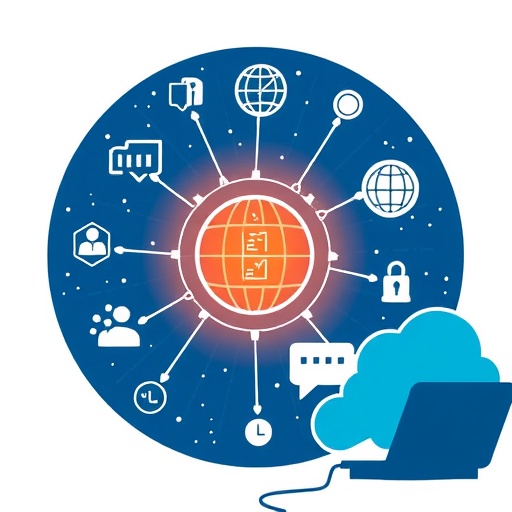In an era characterized by rapid technological advancement, the intersection of education and the Internet of Things (IoT) has emerged as a focal point for researchers worldwide. A pivotal study conducted by Wang and Wang introduces an innovative information sharing and tracking platform tailored for educational management. This research not only identifies the significance of intelligent data utilization but also explores the potential of IoT technology in revolutionizing educational environments.
The platform developed by the researchers is based on the core principles of the Internet of Things, which envisions a network of interconnected devices that communicate and exchange data seamlessly. This concept extends beyond mere connectivity; it encompasses the integration of sophisticated analytics and machine learning algorithms that enable educational institutions to harness data effectively. As a result, stakeholders can make informed decisions that enhance the learning experience for students.
One of the key features of this platform is its ability to promote collaboration among various educational entities, including students, teachers, administrators, and parents. By facilitating a reliable flow of information, the platform empowers these parties to engage actively in the educational process. When students are equipped with timely updates regarding assignments, deadlines, and other academic resources, their engagement and motivation to learn can significantly increase. This fosters a collaborative learning environment where education is a shared endeavor.
The research incorporates a robust tracking mechanism designed to monitor students’ academic progress in real-time. This feature operates through a constellation of IoT devices placed within educational institutions, such as smart classrooms and learning management systems. The tracking system records student performance metrics and generates insightful analytics that can be utilized by educators to customize their teaching approaches. This level of personalization ensures that the needs of diverse learners are met, thereby optimizing the educational experience.
Moreover, the platform employs advanced security protocols to safeguard sensitive data, addressing a major concern in the realm of educational technology. The implementation of encryption techniques ensures that information remains confidential while enabling authorized personnel to access relevant data. Such measures are crucial in gaining the trust of educators and administrators who are often hesitant to adopt new technologies due to privacy and security fears.
Another compelling aspect of the research is its emphasis on scalability. The authors suggest that the information sharing and tracking platform can be tailored to fit institutions of varying sizes and types. Whether it is a small rural school or a large urban university, the platform maintains its integrity and functionality, allowing for unprecedented flexibility in its application. This adaptability promotes widespread adoption, which is essential for maximizing the platform’s potential impact on educational management.
The study further analyzes how the IoT-driven platform can yield substantial cost savings for educational institutions. By leveraging data analytics, schools can identify inefficiencies in resource utilization. For instance, energy management systems can be integrated to monitor energy consumption, significantly reducing operational costs. These savings can then be reallocated to enhance educational resources, staff training, and technology acquisition, ultimately benefiting students.
A notable challenge identified in the research is the need for robust infrastructure to support the deployment of such advanced technologies. In regions where internet access is limited, implementing IoT solutions may face significant barriers. However, the researchers advocate for policies that promote investments in digital infrastructure, emphasizing that equitable access to technology is vital for fostering innovation in educational management.
The insights gained from Wang and Wang’s investigation underscore the transformative potential of IoT in education. By analyzing the integration of innovative tracking and information-sharing platforms, the researchers provide a roadmap for harnessing technology to enrich learning environments. The implications of their findings extend beyond mere administrative efficiency; they can reshape the entire educational landscape, paving the way for a more collaborative and informed approach to learning.
Furthermore, the platform not only facilitates communication but also acts as a repository for educational resources. It allows educators to curate materials and share them effortlessly with students. This democratization of access to information means that learners can engage with a rich tapestry of educational opportunities, independent of geographical constraints.
As the demand for personalized learning continues to grow, the adaptability and resourcefulness of IoT platforms will likely become a cornerstone of future educational methodologies. The potential for personalized learning pathways tailored to individual student needs is immense, positioning technology as a key enabling factor in educational success.
In conclusion, the research conducted by Wang and Wang represents a significant stride toward the future of educational management. Their exploration of an information sharing and tracking platform embedded in IoT technology not only highlights the need for elevated communication but also envisions an education system that is adaptable, efficient, and deeply interconnected. As such innovations unfold, they are bound to leave a lasting imprint on the educational landscape, transforming how we approach teaching and learning in the digital age. The journey toward smarter educational practices is just beginning, but one thing is clear: IoT technology holds the key.
Subject of Research: Educational Management Based on Internet of Things Technology
Article Title: Research on information sharing and tracking platform for educational management based on internet of things technology.
Article References:
Wang, Y., Wang, Z. Research on information sharing and tracking platform for educational management based on internet of things technology.
Discov Artif Intell 5, 320 (2025). https://doi.org/10.1007/s44163-025-00594-1
Image Credits: AI Generated
DOI: https://doi.org/10.1007/s44163-025-00594-1
Keywords: Educational technology, Internet of Things, information sharing, educational management, data analytics.




